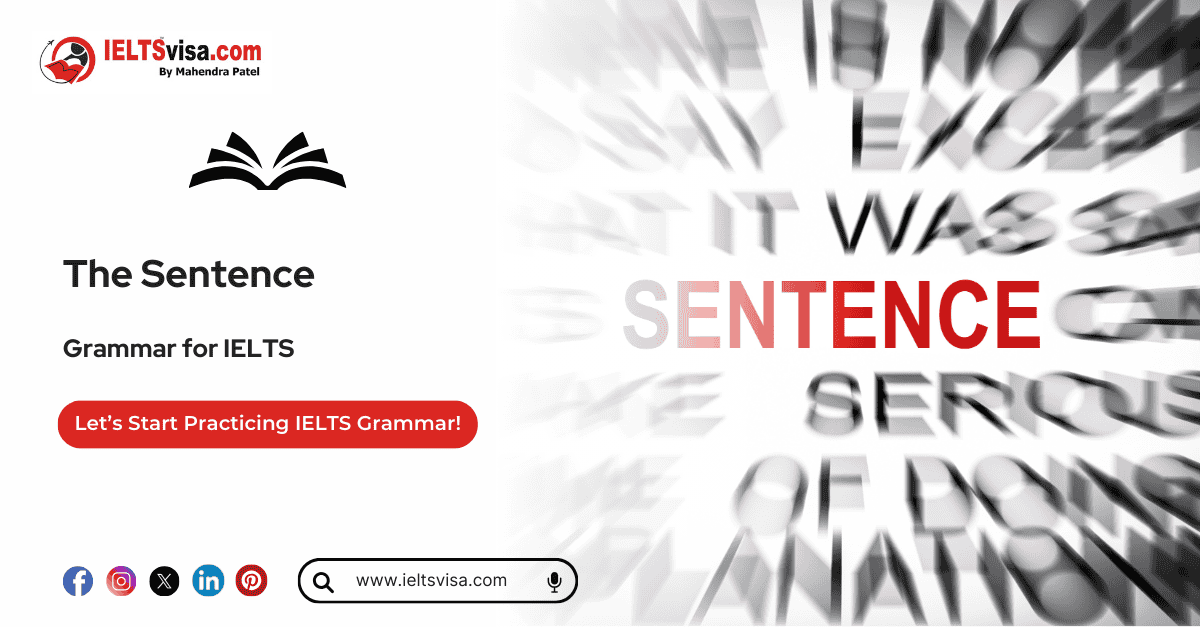Sentence: Definition, Meaning, Types, and Examples
Grammar for IELTS
Sentence: Definition, Meaning, Types, and Examples
Sentence
Understanding sentences is essential for mastering English grammar. A sentence is more than just a collection of words; it is a meaningful arrangement that conveys ideas, questions, emotions, commands, or requests. But does that mean words can be randomly ordered to create a sentence? Not at all! Explore this guide to understand what a sentence is, how it is formed, and its various components and types.
Table of Contents
1. What Is a Sentence? – Meaning and Definition
2. How Sentences Are Formed
3. Elements of a Sentence
4. Components of a Sentence
5. Types of Sentences in English
6. Punctuating Sentences Correctly
7. Examples of Sentences
8. Practice Exercise: Test Your Knowledge
9. Frequently Asked Questions About Sentences
What Is a Sentence? – Meaning and Definition
A sentence is a structured group of words that expresses a complete thought or idea. It can be used to make statements, pose questions, give commands, or express emotions. For a group of words to be considered a sentence, it must be grammatically complete and meaningful.
Definitions:
-
- Oxford Learner’s Dictionary: “A set of words expressing a statement, a question, or an order, usually containing a subject and a verb.”
- Cambridge Dictionary: “A group of words, usually containing a verb, that expresses a thought in the form of a statement, question, instruction, or exclamation.”
How Sentences Are Formed
To construct a sentence, a specific word order must be followed. Sentences consist of subjects, verbs, objects, and sometimes additional modifiers. Typically, the subject appears first, followed by the verb and, optionally, the object or complement.
Elements of a Sentence
Every sentence has two main parts:
1. Subject: A noun, pronoun, or noun phrase that performs the action or is the topic of the sentence.
2. Predicate: The part of the sentence that contains the verb and provides information about the subject.
Examples:
1. The cat (subject) jumped onto the table (predicate).
2. Aisha (subject) is reading a novel (predicate).
Components of a Sentence
A sentence may include the following components:
1. Subject: The doer of the action.
2. Verb: The action or state described in the sentence.
3. Object: The receiver of the action.
4. Complement: A word or phrase that adds information about the subject or object.
5. Adjunct: Words or phrases (often adverbs or adverbial clauses) that provide additional details about the verb.
Examples:
-
- Sarah (subject) wrote (verb) a letter (object) quickly (adjunct).
- The boy (subject) is very smart (complement).
Types of Sentences
Sentences can be classified based on function and structure:
By Function:
1. Declarative: States facts or opinions.
-
-
-
- Example: The sky is blue.
-
-
2. Interrogative: Asks a question.
-
-
-
- Example: Where are you going?
-
-
3. Imperative: Gives a command or makes a request.
-
-
-
- Example: Please close the door.
-
-
4. Exclamatory: Expresses strong emotions or excitement.
-
-
-
- Example: What an amazing view!
-
-
By Structure:
1. Simple Sentence: Contains one independent clause.
-
-
-
- Example: The dog barked.
-
-
2. Compound Sentence: Contains two independent clauses joined by a coordinating conjunction.
-
-
-
- Example: I wanted to go outside, but it started raining.
-
-
3. Complex Sentence: Contains one independent clause and one dependent clause.
-
-
-
- Example: Although it was late, we continued working.
-
-
4. Compound-Complex Sentence: Contains at least two independent clauses and one dependent clause.
-
-
-
- Example: While we waited, the kids played games, and we enjoyed coffee.
-
-
Punctuating Sentences Correctly
Proper punctuation is crucial for clarity and meaning. Here are basic rules for sentence punctuation:
1. Start every sentence with a capital letter.
2. Use periods (.) for declarative and imperative sentences.
3. Use question marks (?) for interrogative sentences.
4. Use exclamation marks (!) for exclamatory sentences.
5. Use commas, semicolons, and colons to separate clauses, lists, or ideas within a sentence.
Examples:
-
-
- She loves painting.
- Did you see that?
- Wow! That’s incredible.
-
Examples of Sentences
-
-
- The flowers are blooming beautifully.
- When does the train arrive?
- Turn off the lights before leaving.
- What an incredible performance!
- Despite the rain, the match continued as planned.
-
Practice Exercise: Rearrange the Words
Rearrange the following words to form meaningful sentences:
1. friend/childhood/my/Riya/is
2. you/home/when/coming/are
3. amazing/was/exhibition/the/absolutely
4. tired/although/he/was/completed/project/his
5. apple/every/day/an/eat
Answers:
1. Riya is my childhood friend.
2. When are you coming home?
3. The exhibition was absolutely amazing.
4. Although he was tired, he completed his project.
5. Eat an apple every day.
Frequently Asked Questions About Sentences
Q1. What is a sentence?
A sentence is a group of words arranged in a specific order to convey a complete idea or thought.
Q2. What are the main types of sentences?
Sentences are classified into declarative, interrogative, imperative, and exclamatory types based on function and into simple, compound, and complex types based on structure.
Q3. How is a sentence punctuated?
Sentences start with a capital letter and end with a period, question mark, or exclamation mark, depending on their type.
Q4. Can you give some examples of sentences?
-
- The sun rises in the east.
- How are you feeling today?
- Close the door, please.
- What a fantastic idea!

Our Books
Master IELTS Speaking Part 1
IELTS Writing Task 1 Book
IELTS Writing Task 2 Book
Practice IELTS Other Modules
IELTS Listening
The IELTS Listening test assesses how well you can understand spoken English in various contexts. It lasts about 30 minutes and is divided into four sections with a total of 40 questions. The listening tasks become increasingly difficult as the test progresses.
IELTS Academic Reading
The IELTS Academic Reading section assesses your ability to understand and interpret a variety of texts in academic settings. It is designed to evaluate a range of reading skills, including skimming for gist, reading for main ideas, reading for detail, understanding inferences, and recognizing a writer's opinions and arguments.
IELTS Speaking
The IELTS Speaking test assesses your ability to communicate in English on everyday topics. It lasts 11-14 minutes and consists of three parts: introduction, cue card, and a discussion based on the cue card topic.
IELTS General Reading
IELTS General Reading tests your ability to understand and interpret various types of texts. Here are some key areas and types of content you can expect to encounter in the reading section, along with tips for effective preparation.
IELTS Academic Writing Task 1
In IELTS Academic Writing Task 1, you are presented with a visual representation of information, such as graphs, charts, tables, or diagrams, and you are required to summarize, compare, or explain the data in your own words.
IELTS General Writing Task 1
In IELTS General Writing Task 1, you are required to write a letter based on a given situation. The letter can be formal, semi-formal, or informal, depending on the prompt. Here’s a breakdown of the key components to include in your letter
IELTS Academic Writing Task 2
In IELTS Academic Writing Task 2, you are required to write an essay in response to a question or topic. Here’s a guide to help you understand the essential elements of this task
IELTS Exam Tips
To succeed in the IELTS exam, practice regularly, familiarize yourself with the test format, improve your vocabulary, develop time management skills, and take mock tests to build confidence.
Grammer for IELTS
Grammar is the foundation of effective communication in English. Understanding tense usage, subject-verb agreement, and sentence structure enhances clarity and coherence in writing and speaking.
Vocabulary for IELTS
Vocabulary plays a crucial role in the IELTS (International English Language Testing System) exam, especially in the Speaking and Writing sections. Here’s an overview of why vocabulary is important and how it impacts your performance
RECENT IELTS SAMPLES QUESTIONS AND ANSWERS
IELTS Speaking Part 1 – Favourite Sujbect – Physics
IELTS Speaking Part 1 - Favourite Sujbect - Physics Q: What is your favourite subject? A: My favourite subject...
IELTS Speaking Part 1 – Present Situation (Student)
IELTS Speaking Part 1 - Present Situation (Student) Q1: Are you a student or do you work?A: I’m a full-time...
IELTS Speaking Part 1 – Present Situation – Employee – as an International Student and Social Worker
IELTS Speaking Part 1 - Present Situation - Employee - as an International Student and Social Worker Q1: Are...
IELTS Speaking Part 1 – Persent Situation – Employee- as an Electric Engineer
IELTS Speaking Part 1 - Persent Situation - Employee- as an Electric Engineer Q1: What do you do for a...
IELTS Speaking Part 1 – Persent Situation – Employee – as an Software Engineer
IELTS Speaking Part 1 - Persent Situation - Employee - as an Software Engineer Q1: What do you do for a...
IELTS Speaking Part 1 – Persent Situation – Married
IELTS Speaking Part 1 - Persent Situation - Married Q1: Are you married?A: Yes, I am married. My spouse and I...




















